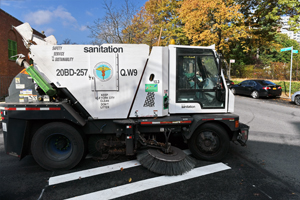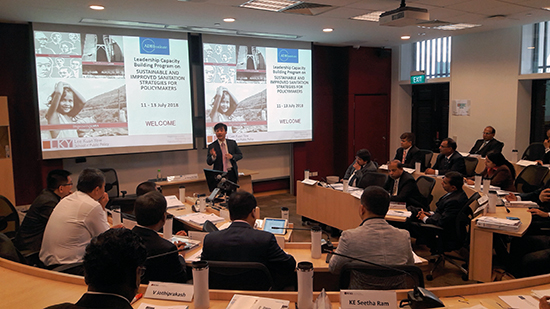
National and local governments in Asia are facing significant challenges to effectively deliver access to sanitation, as well as to properly collect, transport, dispose of, and treat fecal sludge. Actions taken by governments at present have been to implement large-scale sewer networks, which are prohibitively expensive, and which take years to plan and build. To address the growing challenges and requirements of sanitation, many cities are using a combination of on- and off-site sanitation solutions provided by a range of service providers comprising civil society partners, private companies, and municipalities or utility companies. Despite such efforts, coverage of sanitation facilities across cities has been unequal. While the public sewerage system covers high-income areas, low-income areas suffer from poor-quality latrines and inadequate waste collection.
Innovative financing mechanisms are key to improving localized sanitation systems
Given this background, it is necessary to identify both networked and non-networked sanitation systems that are relevant to the local situations and that will help develop innovative financing mechanisms to attract the private sector to deliver these systems.
The Asian Development Bank Institute (ADBI), in collaboration with the Lee Kuan Yew School of Public Policy of the National University of Singapore and in partnership with the Bill & Melinda Gates Foundation, conducted a three-day leadership capacity-building program for sustainable and improved sanitation strategies for policy makers from South Asia from 11 to 13 July 2018 in Singapore. In this inaugural program, 19 government officials responsible for formulating and implementing sanitation projects participated from Bangladesh, Bhutan, India, Nepal, and Sri Lanka. Experts and academics shared case studies on successful examples of innovative citywide inclusive sanitation strategies. The evidence-based analysis and lessons learned from the case studies provided new insights and policy recommendations relating to citywide inclusive sanitation. The program also provided a tool kit for conducting cost–benefit and policy analysis and impact evaluation to make sound decisions for sanitation interventions.
Case studies prepared by academics and experts provided evidence-based insights for policy makers
To initiate policy dialogue for future actions, far-reaching understanding of the overall account and existing country contexts in sanitation remains of paramount importance. Tan Soo Jie Sheng, the course director of the program, opened the sessions giving a comprehensive outlook of the sanitation scenario. Presentations on Bangladesh, Bhutan, Nepal, and Sri Lanka also gave policy makers a better understanding of the institutional and policy initiatives to ramp up the sectors in their individual countries. Pierre Flamand from the Japan Sanitation Consortium, Anil Vyas and Monika Sogani from Manipal University Jaipur, Jothi Prakash from the Indian Institute of Technology Bombay (IIT-Bombay), and Rajesh Pai from BORDA presented their case studies on decentralized sewerage treatment systems from Japan, Jaipur, Navi Mumbai, and various other Indian cities, respectively, to showcase the impacts from the project interventions. In particular, the case study of Saitama city provided great insights into the Johkasou (wastewater treatment) system, which facilitated universal access to sanitation in Japan. This served as a model example for advocating the use of the combined approach in terms of on- and off-site systems to help countries achieve total sanitation coverage.
While we know that Asia is lagging in achieving total sanitation coverage, some Asian countries have shown remarkable progress. Dorai Narayana, a consultant with the Bill & Melinda Gates Foundation, presented Malaysia’s success story by sharing the steps taken by the country with regard to its institutional arrangements and policy mechanisms. He also emphasized how the Government of Malaysia has stressed community participation to accelerate rural sanitation. This idea was reinforced by Subhrendu Pattanayak, a professor at the Sanford School of Public Policy of Duke University, who presented the results of a randomized control trial of the long-term impacts of a community-led total sanitation campaign implemented in Odisha. The study provided policy makers with new learnings on the efficacy of demand-side interventions and their potential impacts.
Understanding the long-term socioeconomic spillover effects from decentralized citywide inclusive sanitation is key to accelerating innovative sanitation interventions
A key deliverable of the program was to educate policy makers about the long-term socioeconomic spillover effects from decentralized citywide inclusive sanitation interventions to help them develop innovative financing models to attract private sector investment. David Robbins, a consultant with the Bill & Melinda Gates Foundation, showcased a preliminary report draft of a case study on the fecal sludge management system in Dumaguete city, Philippines. This pioneering case study, commissioned by ADBI, demonstrates the pay-back earned by the city government through increments in tax revenues, local businesses, and property values following implementation of the system. ADBI also prepared a documentary (to be released) on this case to highlight the positive socioeconomic spillover effects and impacts of the system managed by the city government. Following this presentation, Tan Soo Jie Sheng also trained participants on the methods to conduct a cost–benefit analysis to better assess the long-term benefits from sanitation investments and evaluate their overall sustainability.
In the past, the Singapore River was so polluted that it had hardly any aquatic life because domestic and industrial wastewater was being directly disposed into it without treatment. Joost Burman, a senior research fellow at the Institute of Water Policy of the Lee Kuan Yew School of Public Policy, shared how the Government of Singapore was able to transform the river and the reservoir into an active and beautiful public space regenerating the property prices in the district. The country’s Public Utilities Board also undertook a field trip to the river and Marina Barrage to show participants the actual transformation of the site.
Finally, the program emphasized that core to good sanitation practices remains a vision and motivation to bring about a change by increasing public awareness through effectively communicating policies and results to the public. Jack Sim, founder of the World Toilet Organization, and Leong Ching, an assistant professor at the Lee Kuan Yew School of Public Policy, shared inspiring stories of their journey and their actions to help build the momentum in this direction.
Evidence-based capacity building highlighting successful cases greatly motivated policy makers to replicate and scale solutions
Although development organizations and governments are employing evidence-based studies and mechanisms, it is necessary to target the needs of the sector. More positive stories should be emphasized, instead of those that provide negative evidence of the lack of appropriate sanitation interventions and its ill effects. To attract the private sector, understanding the larger sustainability and economic spillovers of successful cases may indeed prove to be highly persuasive for governments to invest strategically. In this way, bottom–up approaches can be facilitated proactively through state initiatives utilizing decentralized techniques to resolve the sanitation problem. This sentiment was identified in the exit evaluation conducted by ADBI for this program. Several participants expressed how the case study stories contained strong resemblance to their individual country contexts, thereby providing them with inspiration and ideas to replicate similar initiatives for their countries.
One of the participants commented that “the various case studies from Japan, Jaipur, Navi Mumbai, the Philippines, and especially Malaysia by Dorai Narayana teach effectively the success and involvement of the private sector and its paramount importance to develop sustainable sanitation coupled with support from the government and the community as end users.”
Ultimately, the sanitation challenge needs to be met with integrated, innovative, and multi-stakeholder approaches as the impact from these interventions extends beyond the project site to the wider life of the region. While capacity building remains the foundation of imparting knowledge to policy makers, a greater responsibility lies with international development agencies and multilateral development banks in rethinking the channels of knowledge transfer to effectively steer governments in the right direction.








Comments are closed.